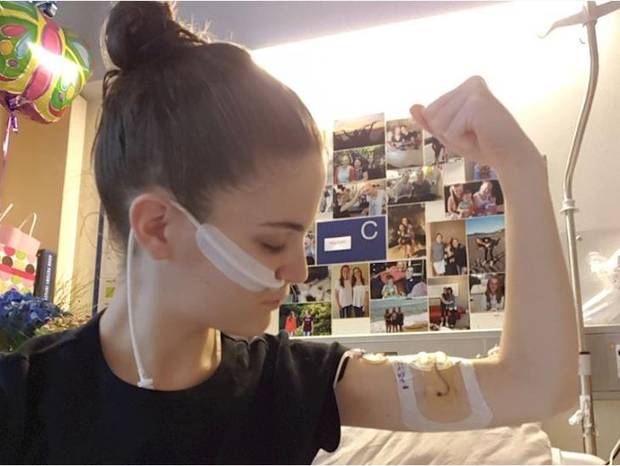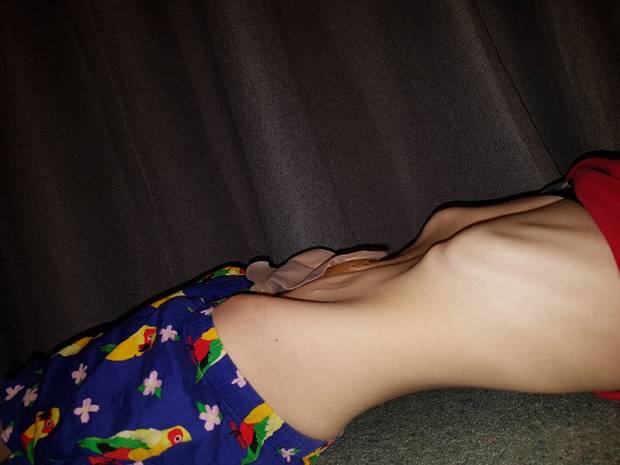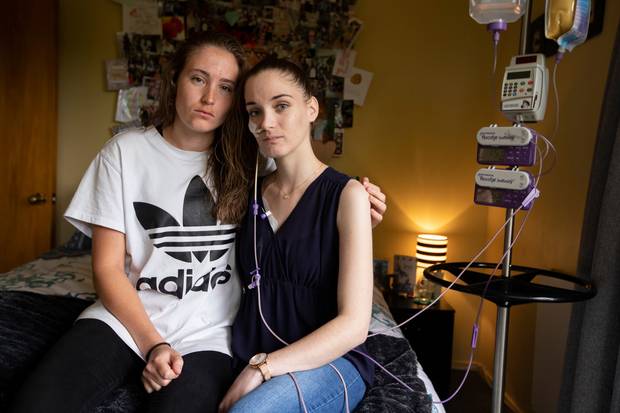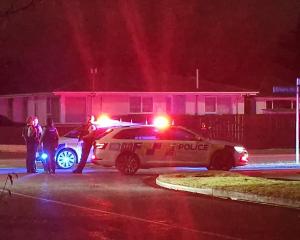Warning: Some readers may find the photos used in this story disturbing.
A young woman with intestinal pain so severe she can't eat has been told by psychiatrists that either she is faking her symptoms or that her mother is causing them.
It wasn't until Georgie Ferris' weight dropped to 33 kilograms and she began planning her funeral that doctors treated her.
The Nelson 22-year-old has Ehlers-Danlos syndrome (EDS), a genetic connective tissue disorder that can lead to gastrointestinal problems.

Previously known as Munchausen syndrome, factitious disorder is a mental illness where a person creates symptoms and is willing to undergo painful or risky tests to get sympathy and special attention.
Munchausen syndrome by proxy is a mental illness and form of child abuse where the caregiver of a child, most often a mother, either makes up fake symptoms or causes real symptoms to make it look like the child is sick.
After the assessment conducted by Dr A and a psychiatry registrar, Ferris says she struggled to get medical treatment for increasing complications stemming from visceral hyperalgesia - sensitivity to pain in the internal organs.
The alleged lack of care forms part of a complaint she made to the Health and Disability Commissioner (HDC) in September 2016.
In the complaint she asked that hospital staff treat her with the care and respect she deserved and that all references to Munchausen syndrome and eating disorders be deleted from her file.
"It takes away all my care options and it's incredibly embarrassing because it's actually not true," Ferris said.
"It's hard enough going to hospital as it is and when you're there you are wanting help and you are turned away because of this label, and I just don't think that's fair at all."
At a meeting at Auckland Hospital in July last year doctors denied Ferris more total parenteral nutrition (TPN), an intravenous food that enters the bloodstream via a Hickman line inserted in the chest.
She had gained weight in the past with TPN but because the implanted tube partially slipped out during a shower at Nelson Hospital, doctors decided it was too dangerous to insert another.
It should be physically impossible for a Hickman line to come out because the skin heals over it, anchoring it inside the chest, however Ferris' malnutrition and the fact her body does not heal normally because of EDS meant the line was unstable.
During the meeting, secretly recorded by Ferris and listened to by the Herald, Auckland Hospital general and colorectal surgeon Associate Professor Dr Greg O'Grady said there had been a pattern of "unusually unsafe" incidents involving Ferris' line and other tubes.

O'Grady said not only did a Hickman line carry a risk of life-threatening conditions including sepsis, air embolism and haemorrhage, but that Ferris needed to re-establish oral nutrition.
"I'd like to hope that I could eat again but I don't know of anyone else with EDS with the severity of gastro issues that I have who has gone on to eat again," Ferris said.
Two months later Ferris told O'Grady in an email she was desperate not to continue losing weight, and that she was concerned Dr A's diagnosis had reduced her treatment options.
Ferris went on to lose 20kg. At her lowest ebb she was just 33kg.
"I had a BMI [Body Mass Index] of 12," Ferris said. A healthy adult BMI ranges between 18.5 and 25.
It wasn't until Maxwell sent photos of her daughter's skeletal body to Nelson Hospital, that doctors there began treatment again.

Ferris first became unwell at 17 when she began vomiting after eating which doctors attributed to a bowel obstruction.
Six months later, with a severe bowel obstruction in Nelson Hospital, the then Year 12 Waimea College student was transferred by air ambulance to Auckland Hospital where she spent two months undergoing extensive tests.
Doctors couldn't pinpoint the cause of her illness and at one point she was sent to an eating disorders clinic in Christchurch for suspected anorexia, but it was identified she did not belong there.
In 2014 Ferris had a temporary colostomy to rest her bowel, but the surgery at Nelson Hospital is now the subject of an HDC complaint after Ferris' colon was accidentally sewn shut.
She spent 12 days in agony including Christmas Day, before being rushed into emergency corrective surgery.
A further surgery to change the colostomy to an ileostomy landed Ferris back in the intestinal failure unit for two months in 2015 where she was given TPN.

"I was unconscious, unresponsive in ICU [intensive care unit]. I was in a comatose state with family saying their goodbyes."
She stabilised and was flown back to Auckland's intestinal failure unit in late October 2015.
There Ferris was psychiatrically assessed three times, including twice by Dr A.
"He asked my mum to leave my room. I got really upset about that because I had just come out of ICU."
A written assessment by Dr A and a psychiatry registrar said there was a recurring theme of over-involvement by Ferris' mother, Robyn Maxwell, in her daughter's care, that Ferris and Maxwell were strangely at ease with the prospect of her being on TPN long term, there was concern around illness-seeking behaviour and that there had been a significantly higher than expected rate of complications in Ferris' treatment.
"There are reasons to be suspicious of somatoform disorder, factitious behaviours, or possibly Munchausen's by proxy," the assessment said.
"What will help Georgia progress from this point is to ensure there is not too much focus on or investigating of symptoms unless objectively indicated."
Ferris and Maxwell deny they are faking Ferris' problems or get any pleasure from it.
"What family would want this? It's not me seeking out surgery, it's me being a mother," Maxwell said.
During the next year Ferris struggled to access medical treatment, and rapidly losing weight she decided to seek help in Australia.
Together with her mother and twin sister Olivia, she raised $30,000 and in March 2017, and at just 38kg, she flew to Melbourne to see neurogastroenterologist Associate Professor Geoff Hebbard at Royal Melbourne Hospital.
"That treatment saved my life. He put a feeding tube in. He put another tube in to drain my stomach. He explained I had to go back on TPN."
Hebbard referred Ferris to psychiatrist Dr Alexandra Krupinska who wrote in April last year the "impressive young woman" presented with anxiety disorder exacerbated by hospital treatment and following her near-death experience.
"Inexplicably, it was suggested that it was all in her head and that she might even have a factitious disorder," Krupinska said.
But three months later Krupinska did a U-turn, copying Ferris into a letter to Dr A on July 5, 2017.
"Dear Chris, it was good talking to you. I have carefully read the three documents that you have forwarded to me and now believe that my assessment, based on just two interviews with Georgia, was very limited as it lacked longitudinal perspective, comprehensive family history and collateral information.
"I certainly agree that she is at great risk of iatrogenic [medical treatment] harm from over-investigating and over-treating her reported symptoms."

In his diagnosis Burling, New Zealand's only EDS specialist, said Ferris then weighed 39kg and possibly had a degree of scurvy from malnutrition.
"I understand she has poor experiences with a certain doctor at Auckland Hospital who has preferred to say that my patients with Ehlers-Danlos syndrome are factitious," Burling said.
Ferris, who once weighed a healthy 58kg, played sport, danced and loved the outdoors, went on to lose a further 6kg - dropping to 33kg.
"I was so sick. I was dying. I was planning my funeral."
In August Maxwell sent photos of her daughter to a contact at Nelson Hospital and Ferris was readmitted for urgent treatment.
"I'm back on TPN now."
Ferris' weight is at 45kg and climbing, and she now has confidence in her Nelson medical team.
Maxwell said her daughter had been treated appallingly.
An assessment of factitious disorder is damaging for patients who have a physical illness, not a mental one, she said.
"It changes the way any of these patients are treated if they have to seek medical help and that is not okay."
Auckland and Nelson Marlborough DHBs said they could not comment on individual patient cases.
However, Nelson Marlborough DHB chief medical officer Dr Nick Baker said the DHB continued to support Ferris' recovery.
"In severe, complex, prolonged illnessses expert opinion is sought locally, nationally and internationally.
"In complex cases it is important, and in the best interests of our patients, for all possible causes to be considered as part of a diagnostic journey to help get the best treatment."
American doctor and EDS sufferer Heidi Collins said she empathised with mothers who were labelled with Munchausen by proxy after her own experience.
When Collins' daughter, Nora, began showing signs of autonomic dysfunction at age 7 in 2009 doctors spent 14 months and $100,000-plus testing for a cause despite a family history of EDS.
Collins said it was only because she threatened a medical malpractice lawsuit that an autonomic test proving positive for postural orthostatic tachycardia syndrome (POTS) was performed.
Studies show POTS is closely associated with EDS according to Burling.
"I think the only thing that kept us from being labelled as being histrionic parents is because I did have MD [Medical Doctor] after my name," Collins said. "I experienced first-hand that level of frustration.
"These people who are told they're crazy or that their parents are harming them makes me realise that navigating everything that happened with Nora could have turned out very differently."
Medical glossary
Munchausen by proxy
A mental illness and form of child abuse where the caregiver of a child, most often a mother, either makes up fake symptoms or causes real symptoms to make it look like the child is sick.
Histrionic
Excessively theatrical or dramatic in character or style.
Autonomic
The autonomic system manages all internal functions such as blood pressure, blood flow, and sweating.
Hickman line
A long, flexible plastic tube that is inserted underneath the chest wall skin and into the large vein draining into the heart to administer medications, as well as for the withdrawal of blood for analysis.
Colostomy and ileostomy
The bowel may have to be rerouted through an artificially created hole (stoma) in the abdomen so that faeces can still leave the body. A colostomy is an operation that connects the colon to the abdominal wall, and an ileostomy connects the last part of the small intestine (ileum) to the abdominal wall.
Visceral hyperalgesia
Sensitivity to pain in the internal organs.
POTS
Postural orthostatic tachycardia syndrome (POTS) is an abnormal rise in heart rate immediately after sitting or standing up, causing dizziness, fainting, sweating and other symptoms. Associated condition to EDS.
TPN
Total parenteral nutrition (TPN) is an intravenous food that enters the bloodstream via a Hickman line inserted into the chest.
By Natalie Akoorie
Comments
Complex conditions become medico legal when reputations are on the line. Failed interventions may then be attributed to the patient's obduracy, deceit or 'defiance'. The patient then loses credibility, because medical practice is assumed to be experienced and informed.
In treatment involving diagnoses listed here, patients need a lawyer in their corner.











